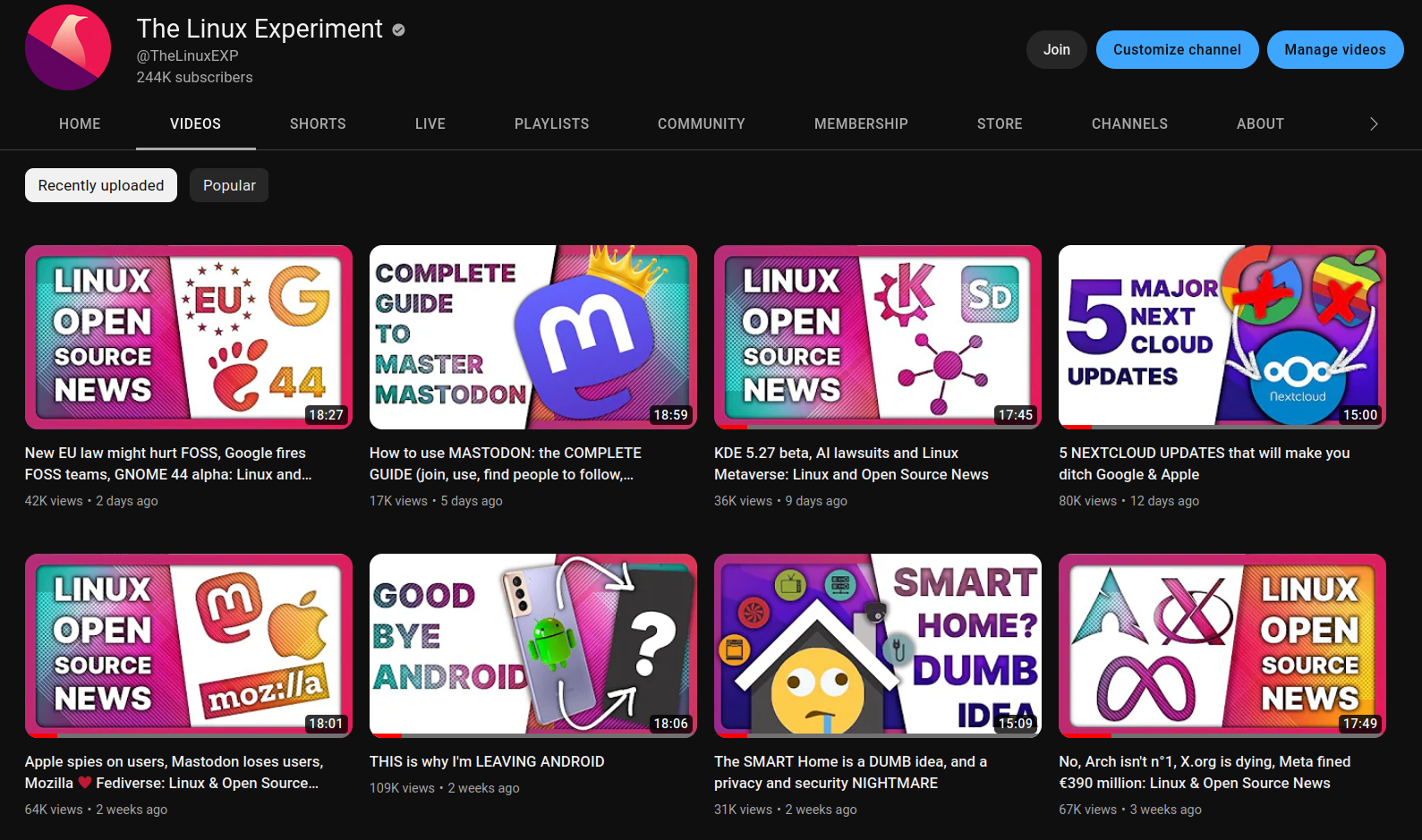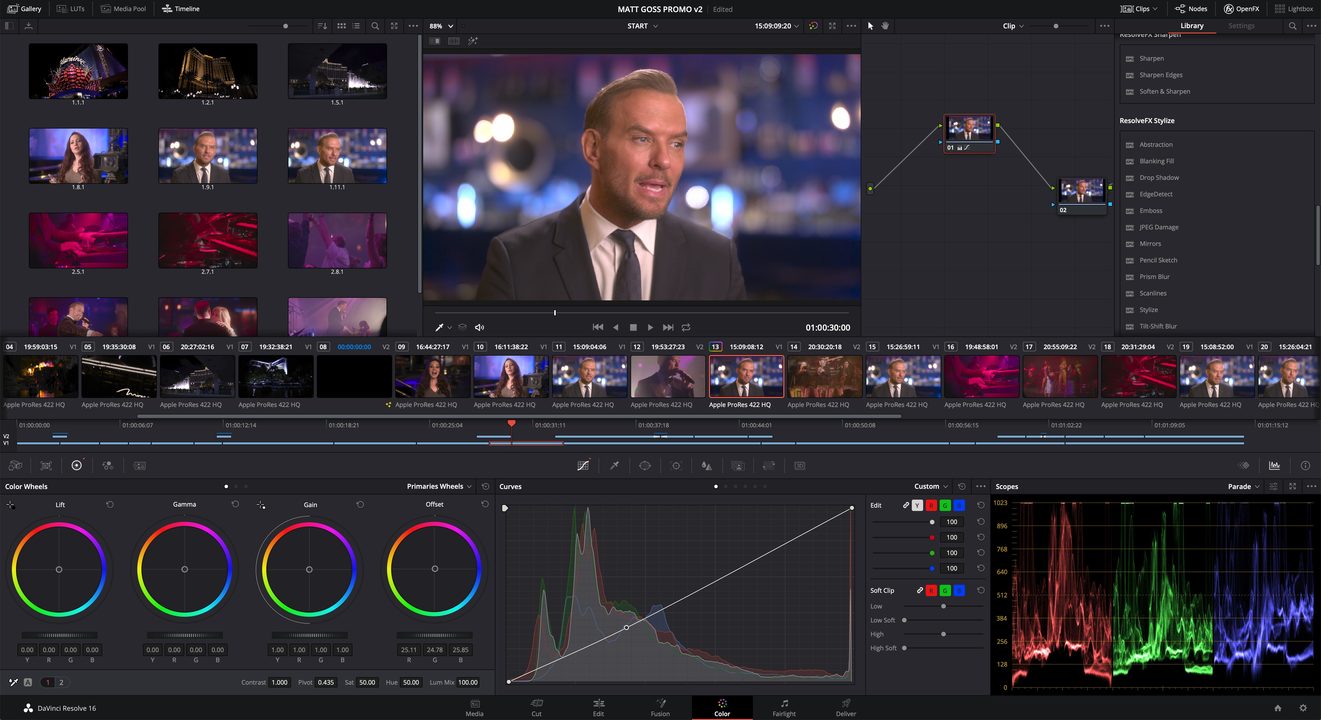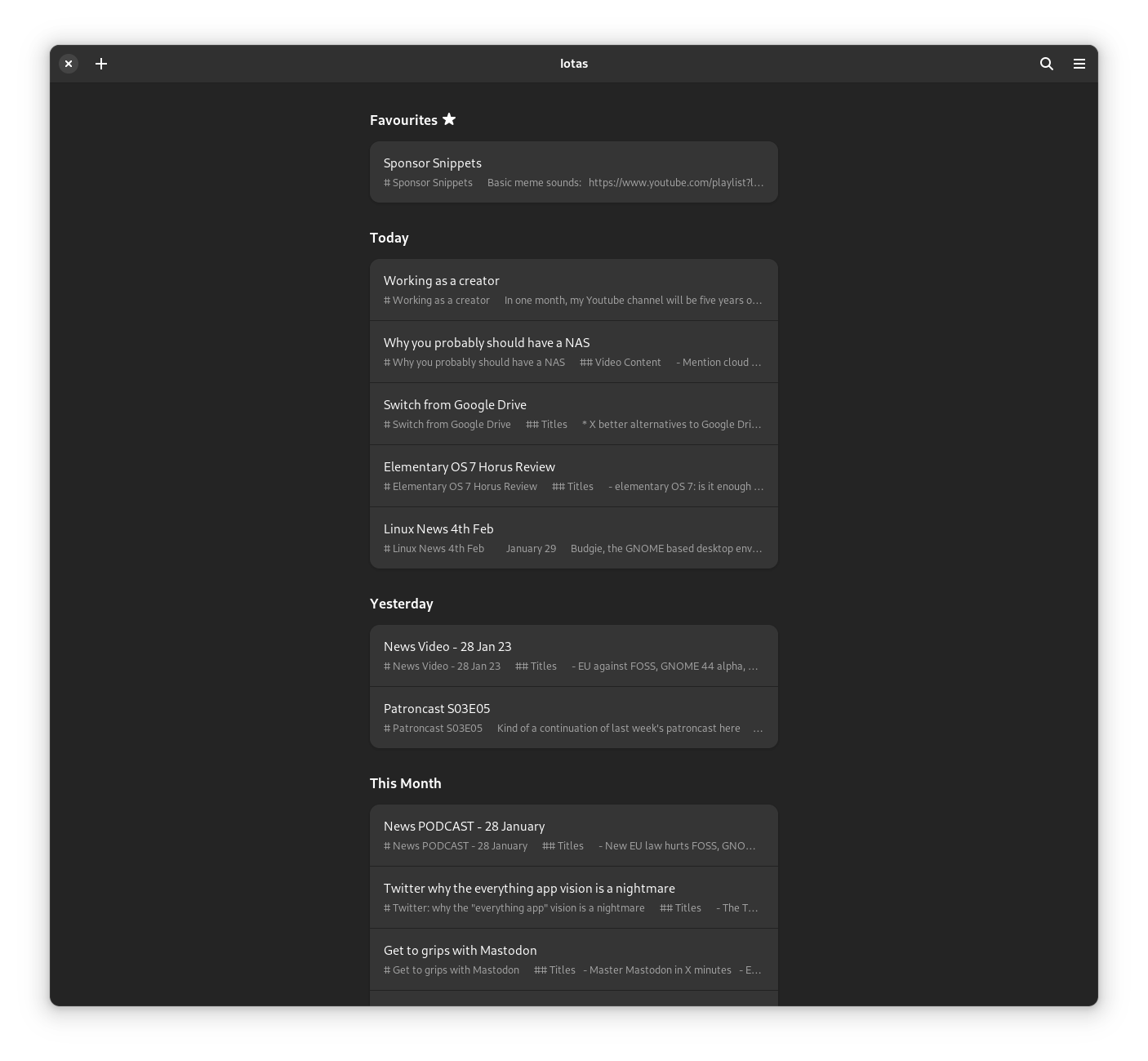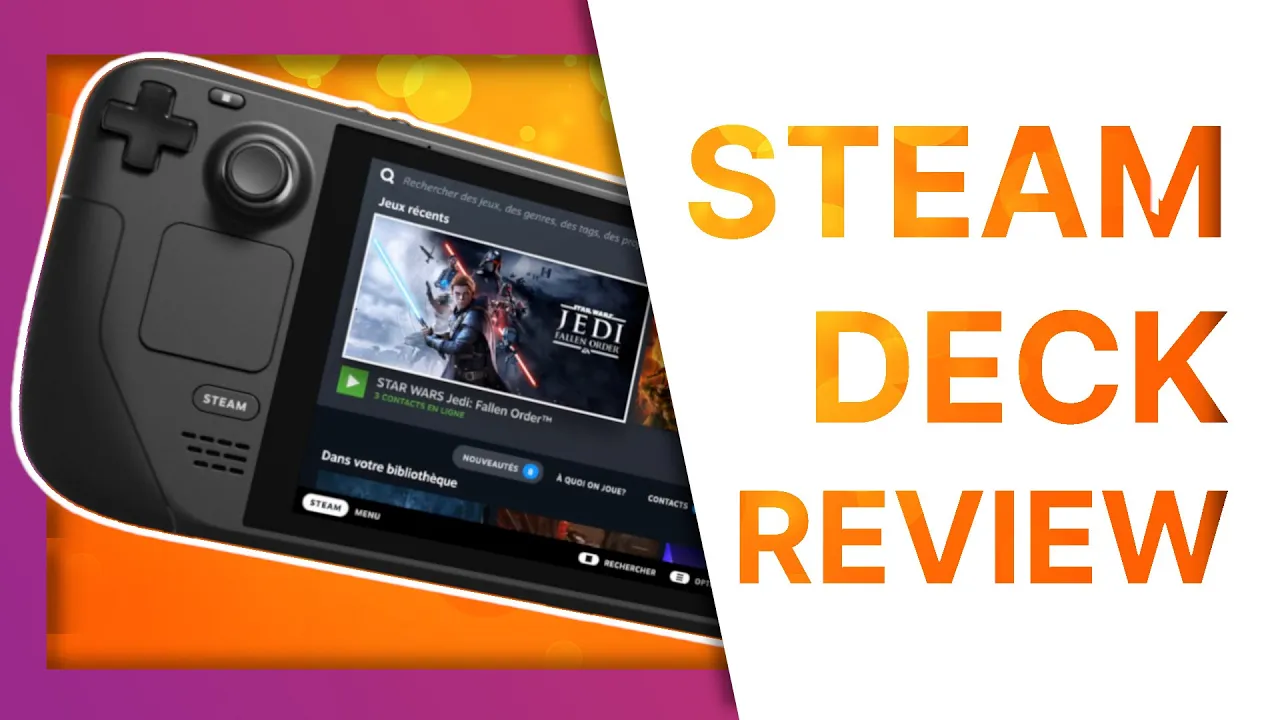Five years of TLE: what is it like to work as a content creator
In a month, The Linux Experiment will be five years old. The channel, not me. So I wanted to write a lengthy brain dump of what it feels like to make a living as someone creating content. Here we go!

In one month, my Youtube channel will be five years old. Five years during which I made from two to three videos per week, excluding a month or two where I burned out by juggling a full time job and content creation. It’s been a fantastic journey, and it had really insane highs, and also really bad lows, and I felt like writing about what it is to work as a content creator today.
What I do
Let’s start with what I do, exactly, because “creator” is a term that’s been used to describe virtually anything, from art, to podcasting, to videos, writing articles or blog posts, or even coding.
My main activity is, of course, the Youtube channel, The Linux Experiment, a name that doesn’t fit all that well nowadays, since it’s not really an experiment anymore, as I’ve been daily driving Linux on all my computers for the past 5 years and never went back to any other operating system, but I like it, so it’s here to stay.

This channel receives at least two, and more often three new videos per week, one being a news recap about everything Linux, open source, or privacy related, and the other two ranging from opinion pieces, experiments I made, distribution reviews, application spotlights, all the way to hardware reviews, and everything in between.
On top of these videos, I also have this website, that I must say I have neglected over the years, a situation that is coming to an end in 2023, as I will be able to at least publish one article per video with a full script that is way more detailed than the Youtube video description, and hopefully some exclusive articles that would not translate well into a full video.
I also create a weekly podcast, the Linux and Open Source News show, that has been running for a month now, and has met with some amount of success, with about two thousand listens per episode, and I also create a weekly podcast for my supporters on Youtube and Patreon, where I talk about the channel, the various projects I start or fail to start, tech, open source, and some personal things.

So, that’s what I do: I create content, in multiple shapes and forms, that I publish on the internet, and this content is what allows me to make a living, thanks to ads, sponsors, and individual support from very nice people who like what I make.
But this didn’t happen in a day, so let’s look at how it happened.
The journey
I started my channel in February 2018, after I moved back to Brest, the city where I studied, and that I had left to go work in Paris. After about eight years in France’s capital city, I decided it was not for me, and went back to what I consider my hometown, I won’t go back on all the personal reasons, there are some articles on that same website that describe that way better.
At the time, I was working as Chief Product Officer for a company that employed about 200 people. It was an exhausting job, full of frustration, hard decisions, meetings all over France, in-person events, and it didn’t fulfill me at all. At the same time, I lacked anything resembling a hobby, apart from playing a few video games, and I wanted to learn something creative.
I decided to learn how to edit videos, so I bought a computer (I didn’t own one anymore, at the time), and since I had spent all my money on a divorce and my move back to Brest, I bought a cheap laptop from Acer, that came without an OS, and with a GPU that I felt would be enough for video editing.

The lack of an OS wasn’t really an issue, as I had already used Linux in the past, so I installed elementary OS on it and called it a day. I didn’t own a camera, my phone didn’t feel like a good enough starting point, and I didn’t have any idea what to make videos about, so I decided to make videos about elementary OS, my experience with it, and everything I could do on it, hence the name “The Linux Experiment”, as I knew I wouldn’t cover elementary OS exclusively.
At the time, I didn’t realize the name was already taken by a collaborative website where multiple people submit articles, but they contacted me and said it was alright for me to use the name, so I stuck with it.
Why did I decide to publish on Youtube? Well, since the goal was to learn how to edit videos, I needed feedback, and what better source than a bunch of strangers on the internet to give you their honest, unfiltered opinion about what you make? My first videos were absolutely terrible, but for some reason, people seemed to enjoy them anyway, and so I kept making them, taking the feedback I could into consideration, moving from unplanned brain dumps over me bumbling on a desktop, to written scripts and more edited content, and I learned to use Pitivi, then Kdenlive, then moved to Davinci Resolve when I felt Kdenlive couldn’t really fit my workflow anymore, and I have since then started dabbling in Fusion, the node based editor that lets you create after effect-like titles, transitions and effects.

I also started filming myself and cutting between my face and screen recordings, then I started adding more personality once I felt comfortable in front of the camera, and a few bad jokes here and there to make the videos less dry, and I think I’ve arrived at some reasonable level of quality in terms of image, audio, and content.
All of that, I did while I had a full time job: Chief Product Office until May 2019, then Product Owner at a startup until March 2022. That second job, I slowly pared back, first by only working at 80%, gaining all my Fridays, then moving to 50%, and finally, in March 2022, by going full time on Youtube and quitting that position.
It took four years for me to be able to confidently quit my job and do Youtube full time. I probably could have quit a year sooner, it would have worked financially, but I didn’t feel confident about it lasting.
So, that’s how it happened. It was an accident, basically. I never planned to make a Youtube channel initially, it was just the easiest way to get some feedback about what I learned. I never planned to quit my job and become a full-time Youtuber, but it just felt like a logical choice to make. Let’s see why.
The good stuff
First, working on making your own content is insanely rewarding. You get to decide what you work on, what you will talk about, and in what way. It forces you to clear your mind and formulate opinions, and it also teaches you a lot: when you tackle a new subject, you’ll find new things you never heard about, you will learn about alternatives, about other ways to do things, and sometimes, a video that started with a specific opinion will end up being the complete opposite after you actually experimented with something. It forces you to get rid of your preconceived notions, and it’s amazing.

It’s also fantastic to define your own hours: you decide when you wake up, when you start working, in what order, when you take a break, and when you resume working. If you don’t feel like doing anything one day, you can, as long as you pick up the pace the next day. Of course, this can lead to some pretty poor work / life balance, so it’s imperative to try and stick to a certain rhythm and calendar. Some days, I just wake up earlier, I finish all I want to do by 2 or 3 P.M. and then I go to the beach, or I play video games the whole afternoon, or I read. It’s an amazing feeling of complete freedom.
Working from home is also a very nice plus: no need to commute at all! I have my own office in my flat, where I work, so there’s still a separation between my personal space, and my workspace, and this really makes working a pleasure. And on top of that, you don’t have to answer to anyone, no micro managing boss looking at what you do, no progress report to submit, no annoying emails or conference calls: the only person you owe anything to is yourself (and sometimes your supporters and sponsors).
And then, there are the other benefits. You get to test hardware that you would have had to buy to lay your hands on, like laptops, single board computers, mini-PCs, or even the Steam Deck! Sometimes, you even get to keep it afterwards, although that’s a rare occurrence (thanks again Valve for gifting me my Deck review unit). And the best thing is: you don’t even have to say nice things about these devices to keep them. I’m perfectly aware that these are benefits that only come when you’ve reached a certain audience of course, but they’re still pretty nice. Right now, I have a Synology NAS sitting in my office, waiting for me to unpack it and make a video about it. It’s something I have never used, and I get to try it out, and give my opinion on it, without any control by Synology themselves. It’s just cool.

And finally, there are advantages to how you can structure your life. I never wanted kids, because it felt like with a “real” 9 to 5 job, it would be too difficult to take care of a child AND have a personal life. But as a content creator, I could see myself tuning my work week and schedule around the needs of a kid, and still managing to have some “me time”, because a lot of what I do these days when I work on a video IS “me time”. I’m not saying it would be easy, but it would definitely be easier than with a regular, more rigid job.
All in all, content creation feels like a dream job for me. I always was very independent, I never liked having to work on ideas I felt (or knew) were bad when they weren’t mine, and so being my own boss and deciding what I do, and when I do it just feels right.
But that’s not to say that everything is perfect, because it’s not.
The bad stuff
Content creation online means confronting your work with the internet, or at least the part of the internet that manages to find it, and this comes with a lot of problems.
First, while the vast majority of people I interact with are excellent, nice, open minded, and know how to express disagreement, or criticism constructively, there is always a part of the audience that feels like they’ve been raised by some caveman somewhere, or that have forgotten all manners and civility once they opened up their web browser.
Some people will just express their disagreement in ways they would never dare in real life, some people try to read between the lines of what you’re saying (if you didn’t mention this then you must be paid by its competitor, thus completely ignoring the fact that if you want your video to be palatable, you have to let some stuff out), and some people will just not accept that, in order to make three videos a week, you simply have to have ways to earn money, through ads, donations, or sponsors, and that you simply can’t do content creation on that scale without a monetary compensation.

Of course, these are fringe elements, drowned in the vast majority of positive people, but as always, one negative comment or remark will stick with you for much longer than a hundred positive ones. It’s the way the human mind works, and while I’ve learned to accept it, move on, and quickly forget, some stuff can still get to you. Disagreeing is fine, it’s even welcomed, but there’s a polite and constructive way to do that.
Then, there’s the incertitude of it. Making videos on Youtube isn’t a “classic” job: the jobs I have worked before where relatively safe: I never really felt like I could get fired without knowing it was coming, and France is pretty good at protecting workers, so I always evolved in a relatively safe environment. Youtube isn’t like that.
You never know what’s going to happen: maybe Youtube is getting replaced by TikTok, and people will stop watching it, maybe your biggest sponsors will drop you next month, and your revenue will take a plunge, maybe people will get bored and stop watching your stuff (a thought that enters my mind every time a video under performs). These aren’t rational thoughts, because, first, Youtube isn’t going away anytime soon, at least not in a few months, it will be a slow decline when it happens. Second, if a sponsor drops me, I have a healthy mix of other sponsors, and plenty more waiting in the wings for an opening (and it could also be an opportunity to raise prices, something I haven’t done since I started getting sponsors). And finally, if people start being disinterested in my videos, I can look at why, and fix the issue, or start adapting the way I cover topics. Still, it’s something you have to deal with: you have no protection. If Youtube decided that privacy related topics, or Linux in general isn’t something they want to push on Youtube, I could lose three quarters of my views in an instant. It could happen, and I have to consider that.
And the final negative for me, is the feeling that you just can’t cover everything you want to. I always feel that I’m missing out on various ideas. I would love to resume the gaming channel, or the Shorts channel, or start another one on another topic, but there is no time to do that, and it’s sometimes hard to accept that you can’t do everything. Either I try and diversify, and risk not being able to make ends meet as I divert time from the profitable activities (namely: Youtube videos), or I must accept that I can’t cover everything.
Conclusion
To finish this lengthy brain dump, I’ll conclude by saying that I sometimes forget how good I have it. Sure, I work ever day of the week, even Sundays sometimes, but I very rarely work eight hours a day, and I take breaks when I want, and for as long as I want.
Sure, it’s a stressful job to manage angry comments and the pressure of always making videos, even when you’re on holidays, so Youtube doesn’t shoot your channel down, but it’s also incredibly rewarding to see all the positive feedback and support people give me.
I’m certain there are other jobs that I would love and that would give me a lot of creative freedom, and while I sometimes miss the emulation of working with other people, the office politics and the water cooler conversations, right now, I would not trade my content creator job for anything else.
So, thank you all for letting me do what I do, and here’s to the next five years of The Linux Experiment, who knows what will come next!
Help support what I do
If you want to keep this website going, please consider subscribing on Patreon, you will get a bunch of cool advantages in the process, like a weekly podcast and the right to vote on video topics I cover on Youtube!



